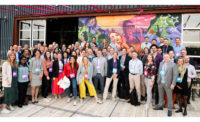AkzoNobel Sets Carbon Reduction Target to Help Tackle Climate Change
AkzoNobel aims to reduce carbon emissions for the whole value chain by 42% by 2030, with 2020 as the baseline.

AkzoNobel has followed up on its commitment to setting science-based sustainability targets by announcing carbon reduction targets for the full value chain. The company has aligned its own sustainability ambitions with the Paris Agreement, which aims to limit global warming and ensure that global temperature rise does not exceed 1.5˚C above pre-industrial levels.
AkzoNobel’s target is to reduce carbon emissions for the whole value chain by 42% by 2030 (baseline 2020). This will apply to the company’s own operations, as well as partners such as customers and suppliers. Currently being officially validated by the Science Based Targets initiative (SBTi), the target will further sharpen and accelerate the company’s vision for its approach to sustainable business
“Setting a target like this really matters,” said AkzoNobel CEO Thierry Vanlancker. “It’s a clear signal that we’re preparing to mobilize our teams globally and take stronger action to tackle climate change. We need to act fast and focus on collaboration and innovation. When push comes to shove, there are those who contribute towards a zero carbon future and those who don't. We’re determined to do all we can and set the example by being the frontrunner in our industry.”
AkzoNobel reports that it is forging ahead of target on two key environmental ambitions: halving its own carbon emissions and having 100% renewable electricity in the company’s operations by 2030. To highlight this progress, the company has announced that it will operate only on renewable electricity in Europe by 2022.
“To achieve our carbon reduction target, we have to look further than our own operations,” Vanlancker said. “So we’ll be encouraging all our value chain partners to transition to lower/zero carbon alternatives. I also encourage our peers to commit to the SBTi, announce their own targets and join us in setting the right example in our industry.”
Learn more about AkzoNobel’s sustainability ambitions at www.akzonobel.com/en/about-us/sustainability. For more information about the Science Based Targets initiative, visit https://sciencebasedtargets.org.
Looking for a reprint of this article?
From high-res PDFs to custom plaques, order your copy today!






